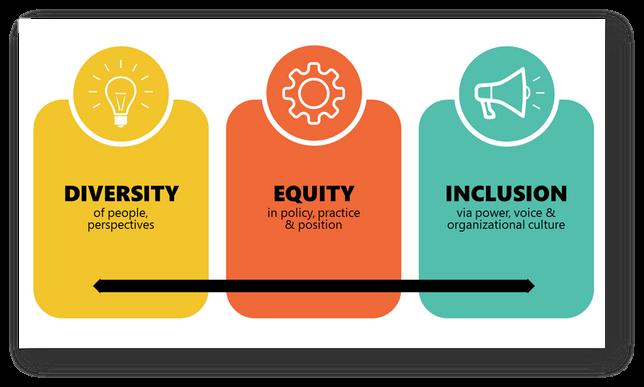
1 minute read
CORPORATE GYAN
Diversity, Equality and Inclusion
Diversity, equity, and inclusion are three closely linked values held by many organizations that are working to be supportive of different groups of individuals, including people of different races, ethnicities, religions, abilities, genders, and sexual orientations
Advertisement
Difference between Diversity, Equality and Inclusion: However, the three terms are interconnected and go hand-in-hand, however there is stark difference in the three Diversity refers to who is represented in the workforce. An organisation with diverse workforce is found to be strong, are better able to respond to challenges, meet the needs of customers, and win best talents. A few examples of diversity workforce are:
1. Gender Diversity- The mix of all genders, male, female, others and or people with different sexual orientation.
2. Age Diversity- If the workforce is a mix of same or different age groups.
3. Ethnicity- Do people in the group are from same national or cultural background.
4. Physical Diversity- Are the people with special ability being a part of the workforce.
5. Neurodiversity- Does the workforce include people with different perspective and thought process. Equity refers to fair treatment for all people, so that the norms, practices, and policies in place. Inclusion refers to how the workforce experiences the workplace and the degree to which organizations embrace all employees and enable them to make meaningful contributions. Companies that are intent on recruiting a diverse workforce must also strive to develop a sufficiently inclusive culture, such that all employees feel their voices will be heard critical if organizations want to retain their talent and unlock the power of their diverse workforce. It has been observed that inclusion is the most underrated however, the most important aspect of DEI. Studies have shown that the diverse workforce in many organizations, are hesitant to voice their statements (emotional), under an impression that they will be judged if they speak openly about their personal lives.
Equity refers to fair treatment for all people, so that the norms, practices, and policies in place.
Inclusion refers to how the workforce experiences the workplace and the degree to which organizations embrace all employees and enable them to make meaningful contributions. Companies that are intent on recruiting a diverse workforce must also strive to develop a sufficiently inclusive culture, such that all employees feel their voices will be heard critical if organizations want to retain their talent and unlock the power of their diverse workforce. It has been observed that inclusion is the most underrated however, the most important aspect of DEI. Studies have shown that the diverse workforce in many organizations, are hesitant to voice their statements (emotional), under an impression that they will be judged if they speak openly about their personal lives.







